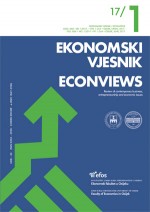DO GOVERNMENT EXPENDITURES AND TRADE DEFICITS AFFECT EACH OTHER IN THE SAME WAY? EVIDENCE FROM TURKEY
DO GOVERNMENT EXPENDITURES AND TRADE DEFICITS AFFECT EACH OTHER IN THE SAME WAY? EVIDENCE FROM TURKEY
Author(s): Tayfur Bayat, İzzet Taşar, Selim Kayhan, Yunus AcciSubject(s): Economy, National Economy, Public Administration, Public Finances
Published by: Sveučilište Josipa Jurja Strossmayera u Osijeku, Ekonomski fakultet u Osijeku
Keywords: Asymmetric causality; government expenditures; trade deficit; twin divergence hypothesis;
Summary/Abstract: The purpose of this study is to determine the causality between trade deficits and government expenditure for the Turkish economy in different time horizons and in the case of different shock types between year 1987 and 2014. By doing so, we aim to understand whether the twin deficit hypothesis is valid in the Turkish economy or whether government expenditures have more ability to cause the movements of trade deficit. To do this, we employ asymmetric causality test developed by Hatemi-J (2012) and Hatemi-J and Roca (2014) and rolling windows causality test developed by Balcilar et al. (2010) methods. Results obtained from all tests imply that there is a bi-directional causality between variables. Different from other causality analysis, asymmetric causality analysis results indicate that an increase in government expenditures reduces trade deficit contrarily to existing literature. This means twin divergence hypothesis might be valid in the Turkish economy instead of twin deficit hypothesis.
- Issue Year: 30/2017
- Issue No: 1
- Page Range: 169-180
- Page Count: 12
- Language: English

